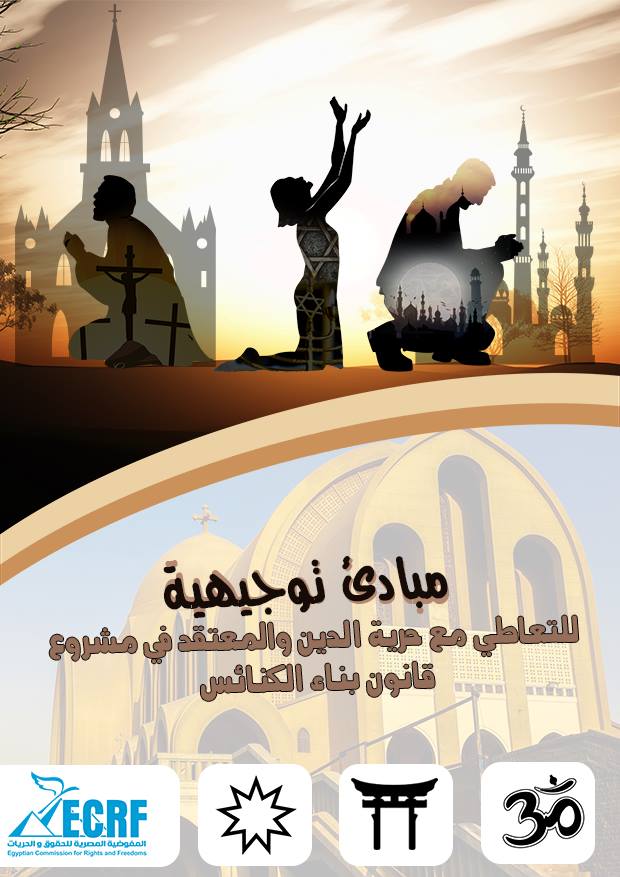Cairo, August 30, 2016
The Egyptian Commission for Rights and Freedoms (ECRF) condemns the parliament’s haste on the discussion of the draft law on ‘building churches’ and the tendency to pass it despite the reservations on many of its clauses. The ECRF also deplores the lack of dialogue and the disregard of the role of civil society in these discussions by limiting them only to the participation of church officials and government representatives, representing discard of democratic rules by undermining the right of citizens to participate in setting the legislations that might organize their life. The ECRF affirms the entitlement of the civil society, political parties and movements, organizations and individuals in participating in discussions related to law drafts, which can create a case of constructive controversy and disagreement around these laws in order to find optimal solutions to the problems facing our society.
ECRF announces the launch of a document of guidelines to deal with the law of ‘building churches‘. That comes in the framework of the belief of the ECRF in the role of the engagement of the civil society in finding solutions for social issues. The paper includes a set of standards and principles of freedom of religion and freedom of practicing religious rites in the light of the international human rights law and the Egyptian constitution, which should be considered by legislatures during the drafting the law.
The document indicated that the right to freedom of religion and belief is an inherent right to all human beings. The International law and the national constitution ensured the protection of individuals exercising their full rights without any discrimination regarding their religion, race, sex, color or any discriminative reason.
The protection of their rights is not only limited to the freedom of individuals to choose a religion or belief but also extends to the freedom of expression of the own religion and the practice of rituals and its education, disregarding whether it’s an individual or a group. Any diminution, restriction or omission of the legal protection of any of those points is a deterioration of the right to freedom of religion and belief.
1- The philosophy of the legislation of the law regarding the building and restoration of churches must be with the aim of protecting and regulating its process, not in aiming at obstructing and imposing unreasonable restrictions on building and maintaining churches.
2- Not to put legislative restrictions limiting the freedom of constructing or repairing churches, which do not compliance with the provisions of the Constitutional Court as referred to in the document. They also must not violate Egypt’s international obligations regarding the right to freedom of religion and belief.
3- The restrictions imposed by the law- in the context of the organization of the process of building churches – should be submitted to the control of necessity and suitability. By means, the restrictions imposed by the legislation must represent a real necessity in order to complete the regulatory process and to protect the freedom of the construction and renovation of churches and without them it is impossible to complete the process. The restrictions must be proportionate to the requirements of the applied construction; whether in general, related to technical and engineering specifications to ensure structural safety of buildings, or in particular, such as those applicable in the process of building and restoration of mosques.
4- There should be a separation between the freedom of the individual in prayer and worship, practicing religious rites or doing spiritual activities, whether as an individual or in a group, in public or in private, from the freedom to worship. By means that the restrictions that are imposed by the legislation on building churches should not affect the freedom of individuals in the community practicing spiritual or religious activities outside the framework of the “church.“
5- The restrictions imposed by the law regulating the construction of churches should not be any reference linking the rights of Christians to constructing and renovating churches with Christian population; since the right of practicing religious rites is originally individual rights. By means, if one Christian family happens to live in a village, it is their full right to practice their religious rituals, including building a church.
6- The restrictions imposed on building and renovating churches should only be imposed by the legal provisions, which shall be clear, direct, and free of any content that may holds more than one meaning.
An Arabic copy of the document is available at ( http://ec-rf.net/?p=1641 )

